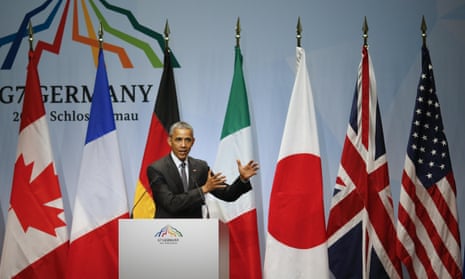The White House moved to boost confidence in its commitment to an international climate change deal on Tuesday, announcing new measures to help disaster-proof developing countries from extreme weather and sea level rise.
The $34m initiative, which would bolster the climate defences of countries such as Bangladesh, Columbia and Ethiopia, was part of what White House officials describe as a “steady drumbeat” of announcements and events ahead of critical climate change talks in Paris at the end of the year.
The plan unveiled on Tuesday involves several US government agencies, the UK Met Office, and businesses such as Google, and is aimed at helping give developing countries access to critical climate data.
The White House has been championing new climate measures nearly every week, to build public support and to demonstrate to international leaders it can get things done – despite opposition from Republicans and industries.
Brian Deese, an advisor to Obama, said the initiative was being rolled out with a view to negotiations now underway in Bonn aimed at getting countries within range of a deal.
“We’re not going to get very far if we keep our efforts contained within our borders,” John Kerry, the secretary of state, said in a statement on Tuesday. “That’s why the United States is deeply committed to helping the rest of the world – especially the poorest and most vulnerable nations – adapt to the changing climate as well.”
Barack Obama joined other G7 leaders on Monday in calling for a phase-out of fossil fuels by the end of the century.
But for developing countries – which do the least to cause climate change but are projected to suffer the worst consequences – an equally important concern is what Obama intends to do to help reduce risks of a future catastrophe.
John Holdren, the White House science advisor, acknowledged there was a “very deliberate attempt” to show the US will help developing countries cope with a climate-changed future.
Obama initially committed to help developing countries cope with climate change at a United Nations summit in September last year.
On Tuesday officials also announced a new climate Peace Corps for the low-lying islands of the Pacific.
The support includes Nasa-generated maps, which project temperature and rainfall patterns to a scale of about 16 miles, which are capable of spewing out nearly 500 different future climate scenarios that can help countries build detailed plans for coping with future weather extremes, such as shifting crops, or moving villages away from flood-prone areas.
The data should help countries such as low-lying Bangladesh prepare for floods, or Ethiopia plan crops that could withstand future droughts.
“We need help in collecting climate-related data and improving early warning systems for flood and drought,” Mohammad Ziauddin, the Bangladesh ambassador to the US, said.
White House officials acknowledged the initiatives are intended to counter the very strong streak of scepticism in the international community that the US will be able to deliver on Obama’s climate commitments – because of court challenges and blanket opposition from Republicans in Congress.
Republicans in Congress have vowed to block the EPA rules, and are aiming to cut back the $3bn that Obama pledged to an international fund to help developing countries cope with climate change.
The Environmental Protection Agency won one victory on Tuesday when the US court of appeals for the DC circuit barred coal-mining companies and Republican-led states from challenging its authority to put limits on carbon pollution from power plants.
The EPA rules – the first limiting carbon dioxide emissions from power plants and the pillar of Obama’s climate change plan – are due to be finalised this summer.
Republicans, coupled with coal mining and electricity companies, hired Obama’s old Harvard law professor, Laurence Tribe, to challenge the agency’s authority.
However, the judges said on Tuesday that Murray Energy and coal states such as West Virginia had to wait for the EPA to adopt the rule before launching their legal battle. The judges did not close the door on future challenges, once the rules are released.

Comments (…)
Sign in or create your Guardian account to join the discussion